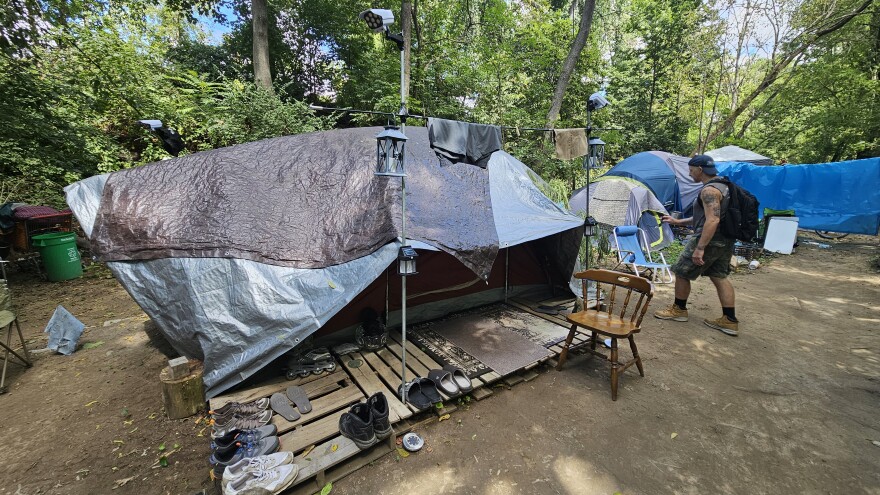ALLENTOWN, Pa. — An initiative to relocate dozens of people living in a homeless encampment to a “safe camping” location in Allentown will not happen quickly, as some officials’ and many advocates had hoped.
Allentown City Council last month gave Mayor Matt Tuerk 30 days to acquire a property where residents now at the encampment along Jordan Creek could safely live in tents while officials and advocates searched for more permanent housing solutions.
After a community conversation at the Allentown YMCA’s Warming Station — which will open early to welcome up to 80 people from the camp and other areas each night — Tuerk told LehighValleyNews.com he would not meet council’s deadline.
He asked for at least 60 days to study the viability of establishing safe-camping or safe-parking sites, which are monitored areas where people can securely live in tents or their vehicles and access sanitary facilities.
The mayor delivered an update to council Wednesday.
He credited the Allentown Health Bureau and Danielle Mineo, Allentown's unhoused services coordinator, for leading the study with help from Erin Connelly of the regional United Way and Christina DiPierro, who chairs the city's Commission on Homelessness.
'Nothing that meets those criteria'
They examined successful safe-camping sites in Seattle, New Mexico, Berks County and Harrisburg, where the "Miracle Community" is offering refuge to people being displaced from an encampment known as Tent City.
Most are run by nonprofits, not government agencies, and none was immediately successful, according to the mayor's preliminary report on safe camping and safe parking.
The study also analyzed city-owned properties to determine whether any “meet the needs of our unsheltered neighbors,” but found none, Tuerk said.
“The long and the short of it is: It's not feasible for the city of Allentown to operate a safe camping site in the immediate term."Mayor Matt Tuerk
“Many of us have passed by sites that look like they'd be great for safe camping,” Tuerk told council.
“What is not immediately evident is that those are often former industrial sites that have contaminated soils and are not suitable for any type of housing, much less camping.”
A site for safe camping should be deforested, relatively flat and close to services for residents who would live there, he said.
Many of the 48 encampment residents who were surveyed said they want to stay close to Jordan Meadows to continue receiving services, according to the report.
“There's nothing that meets those criteria within the city's inventory,” the mayor said.
Potential for partnerships
But there are many privately owned properties in Allentown that fit the bill, according to the study.
The former Community Corrections Center in Salisbury Township could provide some form of shelter in the short term.
The building, which has been vacant after shutting amid the coronavirus pandemic, can fit up to 400 beds.
Establishing a shelter there would require many downtown nonprofits to find new ways to deliver their services to residents, though, Tuerk said.
“It shouldn't exclusively come down to the city of Allentown."Mayor Matt Tuerk
A nongovernmental agency should conduct a deeper analysis that includes unused industrial sites, warehouses, old shopping centers, school buildings and vacant lots, the feasibility study says.
“The long and the short of it is: It's not feasible for the city of Allentown to operate a safe camping site in the immediate term,” Tuerk said.
“That is not, ‘No way, no how, we can’t do this,’” he said, suggesting the city still could partner “in the establishment of some kind of safe-camping, safe-parking site within the Lehigh Valley.”
He again urged officials from other municipalities to “step up” to address homelessness and a regional housing crisis.
“It shouldn't exclusively come down to the city of Allentown,” Tuerk said.
The city does not have the “capacity” to plan, establish and manage a safe-camping site, nor does any single nonprofit in the region, Tuerk said.
But a collaborative approach could generate opportunities to help the Lehigh Valley’s homeless, he said.
A point-in-time count in January found more than 760 people were without homes, with about 360 in Allentown.
About 75 people still were living at the Jordan Creek encampment as city officials conducted interviews for the safe-camping feasibility study.


